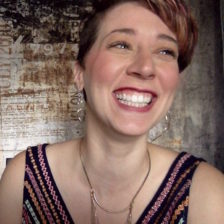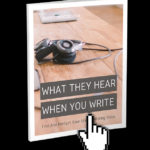Like most copywriters, I have a love/hate relationship with fear.
The psychology of fear has always been a fascinating topic for me. It’s one that is exploited often in the marketing world.
Humans are afraid of a lot of stuff. Afraid that we won’t be successful, afraid that people will laugh at us, afraid that we don’t know what we’re doing, afraid to be alone — you get it, the list goes on.
Fear can be a powerful motivator for both purchases and for action. We create urgency and scarcity for just that reason. When people are afraid they might miss something and be left behind — they buy.
A lot of times we as copywriters do this for their own good. People will procrastinate out of fear, too (what if it doesn’t work? what if I fail at this too? what if I make a mistake?). So as a copywriter, I have to give one fear (fear of missing out) more power than the other (fear of making the wrong decision). Otherwise, people will remain paralyzed even with a solution in front of them.
Fear can make us do and say ugly things, too. And that’s what I’ve been thinking about this week. You see fear being exploited and misdirected every time you turn on the news. We expect it from pundits and politicians. What I’ve seen this week that is most disturbing is not from either of them.
I have two kids. I saw the video of the toddler in the gorilla cage and I read the graphic details of the baby snatched by an alligator at Disney. I also saw the internet backlash.
I’m not going to rehash all the awful, hurtful comments about the parents. The memes. The judgment. The shaming.
But I’m going to try to shed light on where it comes from.
As parents, when we read about a father trying desperately to wrestle his son from an alligator at a resort beach on vacation, our first reaction is fear. We see our baby’s face. Our brain immediately says “Holy shit, what if that was my son?”
But our brains are pretty amazing contraptions. As soon as we have that terrible, awful, terrifying thought, our brain snaps into action. It tries to protect us from that gut-wrenching fear. So it searches for reason. For a way to make sense of it. For a way to not think about that it could have easily been our baby.
So it latches on to something. We read the article and we find the reason. Ah! There was a “No Swimming” sign. Perfect. The brain starts feeding us the ammo we need. We would NEVER ignore a sign like that. We are good parents. That’s the reason this happened. They were neglectful parents that ignored warnings. We are good parents. They are bad parents. This could never happen to me. Now our fears are suddenly transformed into judgement. Judgement is much easier for our brain to handle. We can rest easy now knowing that we are good and they are bad.
Except, it’s not that easy. If we start to self-reflect, that story that our brain concocted to protect itself starts to break down.
We start to think about the mistakes we made. We start to wonder if we really would follow the sign. And that’s where we have a choice.
We can choose to feel empathy or we can choose to cling to our fantastical idea that we are good and they are bad. That our kids are safe because they have loving parents. That nothing bad can happen if you do the right things. And this is the choice you see being made on the internet.
There are two camps — “this could have been me” and “this could NEVER be me.” One has recognized the reality of the world and one has clung to self-preservation. To believing the lies in their own mind that they are better, more loving, more attentive parents and therefore, they are safe.
About 5 years ago, I got a phone call at 8am on a Saturday from a good friend who happened to be out driving looking for garage sales in my neighborhood. My 3-year-old son and almost 2-year-old daughter were standing in the street in their diapers trying to get to the playground down the block.
My clever little toddler had woken up early, let his sister out of her crib, unlocked the deadbolt and knob on the front door (I had no idea he was capable of this) and walked hand-in-hand with her out of the house while we slept.
My children were saved from tragedy by a stroke of amazing good luck.
I can’t in good conscious fall in the “This could NEVER be me” camp. Would I have followed the warnings at Disney? Perhaps. Or maybe, in the spirit of giving my son some beautiful memories, I would have let him dip his feet in the water or play in the wet sand. I can’t say for sure.
And if you dig deep, neither can you.
Understanding why we take certain actions or say certain things makes us better copywriters. Better marketers. Better business owners. And… most importantly, better humans.


Holy crap that must’ve been terrifying. I can’t honestly imagine what that must feel like as a parent, although I think I have been the kid in your story. Since I grew up near the ocean, I’ve terrified my parents more than once by swimming out beyond the waves, into the current, with my little brother along with me. I shiver in retrospect.
Maybe there’s a third camp: people who have no empathy for themselves. People who think, “I made a mistake, but I will never let it happen again.” Then proceed to beat themselves up when they mess up for the second time. People who torment themselves with self-talk like: “You should’ve known better. What were you thinking? You’re so stupid!” People who, because they can’t accept their own actions, treat others the same way they treat themselves: badly.
Then again, maybe that’s just the choice you highlighted in bold. To empathize with others, you have to start with yourself. I guess some people just don’t.
By the way Abbey, do you know the book “How to Talk So Kids Will Listen & Listen So Kids Will Talk”? It’s meant for parents obviously, but I’ve learned a ton from it on empathy in general. Highly recommended.
Cheers,
Jackson
I’ve been on your site for a while have enjoyed a few of your posts. I must say that this one, and “A National Tragedy Is Not A Marketing Opportunity” are both probably an indication of where western society is in this day and age.
We have four daughters, all grown and left home now, but when I heard the news about the toddler at Disney World, it was their faces that I saw, and that of my 5 year old grandson.
It was the same situation with the gorilla in the zoo. I can only imagine how the parents in each situation feel. I wasn’t there and I don’t know how I would have reacted, but I know how I feel when I think about thses events..
I guess that it comes down to the condition of the human heart, something that has been pondered and written about for thousands of years.
Thank you for allowing me to comment on your post.
I think that reaching out to the community in an effort to be a valuable part of the community is really important to growing the idea of church. The society I am a part of is involved in several collaborative projects with other faith groups in our neighborhood in an effort to strengthen the spiritual foundation and sense of community and family in our neonsbirhood. &gbsp;| &nbhp;
I agree Luella.